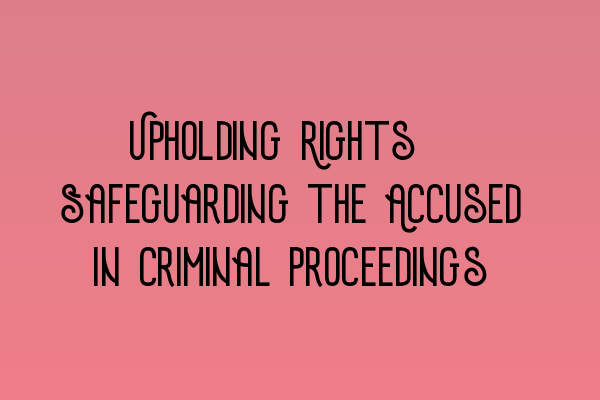Upholding Rights: Safeguarding the Accused in Criminal Proceedings
In the criminal justice system, every individual is entitled to certain rights that ensure fair and just proceedings. These rights act as a safeguard, maintaining the balance between the power of the state and the rights of the accused. As a solicitor specializing in criminal law and practice, it is my duty to fiercely advocate for these rights and ensure they are upheld throughout the legal process.
As we delve deeper into the topic of safeguarding the accused, we must first understand the fundamental principles that underpin a fair trial. The right to a fair trial is enshrined in Article 6 of the European Convention on Human Rights and is essential for maintaining the integrity of the criminal justice system. This right guarantees that every individual facing criminal charges has the right to be presumed innocent until proven guilty, ensuring that the burden of proof lies squarely with the prosecution.
To further protect the rights of the accused, stringent procedural safeguards are in place. These safeguards aim to ensure that no individual is subjected to arbitrary or unlawful detention. The police must adhere to strict rules when making an arrest, providing clear and concise reasons for the arrest, and promptly informing the accused of their rights. This not only prevents the abuse of power but also contributes to maintaining public trust in the justice system.
The importance of legal representation cannot be overstated when it comes to safeguarding the rights of the accused. Every individual facing criminal charges has the right to legal counsel, whether at the police station or in court. A solicitor plays a pivotal role in advising the accused, explaining their options, and meticulously building a strong defense. This level of representation ensures that the accused is not left vulnerable in the complex and often intimidating legal process.
In addition to legal representation, effective communication between solicitors and clients also plays a crucial part in safeguarding the rights of the accused. It is essential to establish a trusting relationship where the client feels comfortable disclosing all relevant information. This allows the solicitor to make informed decisions and construct a robust defense strategy that is tailored to the client’s circumstances.
Technology has also played an integral role in safeguarding the rights of the accused. Digital platforms and advancements have facilitated the efficient exchange of information and evidence, ensuring that the accused has access to the necessary materials to build their case. This technology has the power to expedite proceedings, guaranteeing timely justice while upholding the rights of the accused.
Transparency and open justice are key components of safeguarding the accused. By allowing public access to court proceedings and judgments, the justice system ensures accountability and prevents the abuse of power. Open justice acts as a safeguard against any potential miscarriage of justice, guaranteeing that both the accused and the public can have confidence in the process.
Lastly, it is imperative that continuous professional development and education remain a priority for those working in criminal law and practice. Staying updated with the evolving legal landscape and actively engaging in professional development opportunities enables solicitors to better safeguard the rights of the accused. This commitment to growth allows solicitors to provide superior representation, ensuring that justice is served and the rights of the accused are protected.
In conclusion, safeguarding the rights of the accused is a fundamental pillar of the criminal justice system. Upholding these rights ensures the fair and just treatment of individuals facing criminal charges, maintaining the integrity of the legal process. As a solicitor specializing in criminal law and practice, it is my duty to fiercely champion these rights and ensure they are safeguarded at every stage of the criminal proceedings.
